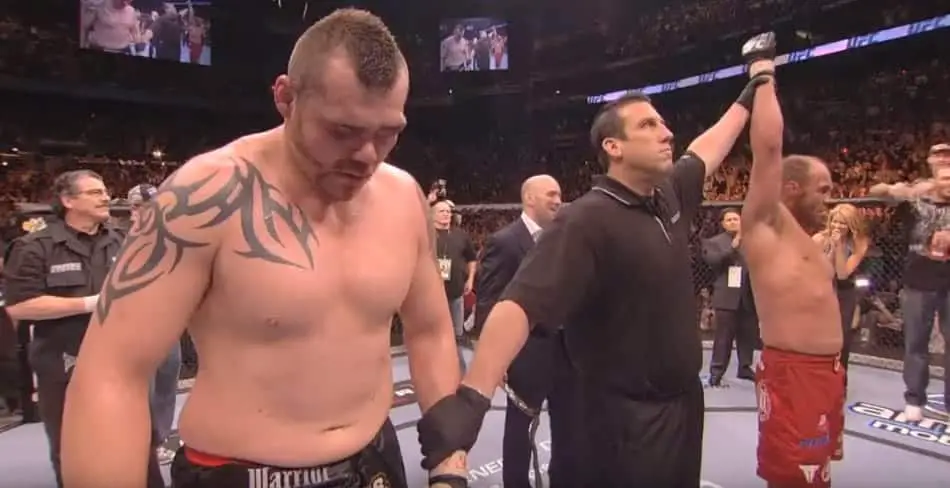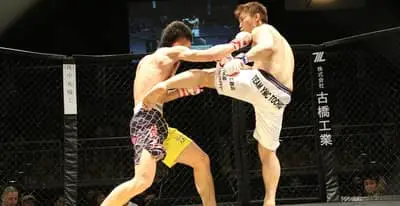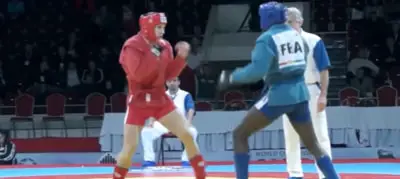
Fighters start competing at very different ages. Some people start MMA in their teens. For example champions like George Saint Pierre and Rory MacDonald already had several fights before they turn 18. But there are others that start in their early to mid-30s. For example, Holly Holm fought for the first time in the octagon when she was 30. Randy Couture had his first fight when he was 34 and became a legend.
Of course, these people had huge experience in other combat sports before starting MMA. But what about an average person?
How old is too old to start a career in MMA? Every person is different but generally, the body starts to decline in our early to mid-30s. That’s why most MMA fighters retire when they are 35-40. So if you are around that age it’s probably too late.
But that doesn’t mean you can’t start to compete if you are that age or even older. I have seen videos of people in their rally 50s who make their debuts (although that’s super rare).
However, they are fighting only 1-2 times as amateurs and probably not getting paid. They do it just because they want to try, not to make a career out of it. And this article is about how old you can be and still have a decent career in MMA.
To determine that, there are 4 main questions and several subquestions you need to answer:
1. Have you been practicing combat sports and if yes for how long?
- What combat sports? (Wrestling is the easiest to transition to MMA then is BJJ, kickboxing/Muay Thai, boxing, and traditional martial arts are the hardest to transition)
- How often you work out? Less than 3 times a week or more? Are you doing some shadow boxing or other exercises in your free time?
- Are you doing well in the gym? (during sparring and strength and conditioning workouts)
- Are you training with professionals or amateur fighters? Or it’s more of a fitness gym?
2. Do you have experience with other sports?
- If yes, what sports? (For example, Greg Hardy started training MMA when he was 29-30 but he had a football career)
- Have you competed and at what level?
- Are you a fast learner when it comes to sports?
- Answer this question only if you don’t have at least several years of experience in combat sports such as kickboxing; boxing; Muay Thai; wrestling or BJJ
3. How athletic are you?
- Above average, average or below? Stand-up fighting requires speed, wrestling requires strength (and also speed). The main thing in BJJ is a technique but still, you need speed and strength to get the fight to the ground.
- Do you think you have above the average speed, strength or endurance? Speed is usually the first thing that goes away with age, followed by endurance.
- Do you have a long reach (arm and leg reach)
4. What is your weight class?
- The heavier the weight class is the later people retire. That’s because when you lose your speed who have no chance against the fast fighters in the lighter weight classes. It’s not uncommon to see a 37-38 heavyweight champion. So heavier weight classes are good for people who start late. For instance, Travis Browne began training MMA at 26 without previous combat sports experience and eventually became a top 3 heavyweight.
- If you are a heavyweight (or light heavyweight) are you in a good shape or you have a lot of fat? There are successful overweight fighters, for example, Roy Nelson, Mark Hunt, and Daniel Cormier but they compensate with their speed, skill and general athleticism.
If most of the answers aren’t very promising you most likely won’t have a successful career in MMA. By a successful career, I mean getting a contract in the major MMA organizations – UFC, Bellator, One Championship, PFL because that’s where you start getting paid well.
Even if you are still young (25-26) but your athleticism is below the average and you don’t have previous experience in sports you most likely won’t have a very successful career.
I’m not saying you shouldn’t try, though. If you really want to do it you definitely should fight as an amateur at least once (if you don’t know how I have a cool article on how to get your first MMA fight). The thing is that you’ll probably have to work super hard to catch up with the rest of the fighters. Which is basically swimming against the current.
Time Frame
Also if you are just starting, you need to consider the time frame. You’ll need at least 6 months to a year of training before your first amateur fight (if you are a fast learner and train hard). Then it’s a very good idea to fight at least 2 more times as an amateur to gain some experience before turning pro.
You don’t want to have a losing record as a pro, so a little more experience is crucial. I would recommend fighting as many times as you can as an amateur because you can’t go back amateur once you turn pro. But in case you aren’t very young 3 amateur fights are just fine, you don’t want to waste any time.
Then you’ll probably need 7-12 pro fights before getting into a major organization and to start making real money. Let’s say you fight every other month (which is a lot) and let’s say you fight 10 times in a small organization.
After doing some math we can see that if you start training now, the shortest time before starting making good money out of MMA will be in 32 months. And that’s if you learn fast; show talent; fight often, which you should do if you think you aren’t that young and have a good enough record so the big organizations are interested in you.
A cool thing is that the website fightopinion.com did a research that showed that unlike other sports MMA fighters don’t reach their prime at a certain age. They reach it 4 years after they start to compete and start to decline in the 9th year.
They make an argument against starting to compete in MMA too young (before 20) because you’ll reach your sport prime before you reach your physical prime (which is considered to be between 27-31).
I talk about that rule in more detail in my article on average career length of an MMA fighter which I highly recommend checking out after you finish this one.
In the rest of the article, I’ll quickly analyze each of the questions above so you can see which ones are the absolute most important and which ones aren’t that crucial.
1) Experience in Martial Arts
Having experience in other martial arts/combat sports can greatly compensate for your age disadvantage. Even today, there are athletes from kickboxing, wrestling, and other combat sports who start doing MMA in their late 20s and have great success.
But not every martial art transitions well to MMA. Most traditional martial arts (karate, taekwondo, etc) have pretty cool techniques and footwork but they just aren’t enough to ensure success. For example, in Taekwondo there are no punches in the head which is a huge problem because that’s the main thing people are going to throw at you. Boxers, for instance, spend years learning how to land and defend such punches.
As I mentioned wrestling is the easiest sport to transition because the better wrestler dictates where the fight goes. Even if you can’t finish your opponent’s yet, you can just control them and get a decision. However ever wrestlers need to learn some BJJ in order to defend submission attempts and some striking to be able to mix things up and defend punches and kicks.
BJJ also isn’t enough nowadays. All mma fighters have some BJJ and wrestling training and getting them to the ground and submitting them isn’t an easy task especially if you don’t have good takedowns and some striking defense. Also when strikes are involved ground fighting becomes different. Not every position that is safe in BJJ is safe in MMA.
Boxing is a pretty popular sport because it doesn’t require much athleticism. But even if you have experience in boxing, you still need to learn kicking defense, some wrestling, and BJJ. The same goes for kickboxing (besides the kicking defense).
Probably the best sport to choose if you want to be a purist is Muay Thai. It has punches and kick, elbows and knees and also clinching. Learning some basic takedown defense like getting underhooks, whizzer and sprawl to keep the fight on the feet and you can be prettty succesful.
That’s what basically the UFC fighter Khalil Rountree Jr. did. You probably won’t become a champion but you can get to the big promotions if your striking is good and you can stop most takedown attempts.
Competition
Wrestlers do so well in MMA not only because of their skillset but because they have huge experience in different tournaments. Some high school/college wrestlers compete every week which gives them a huge advantage over those who don’t have such experience. After 100+ wrestling matches, a 3-4 MMA fights a year isn’t that big of a deal. They know how to compose themselves under the pressure and focus on winning.
If you have experience in any sort of combat sports competition your chances of becoming successful in MMA skyrockets.
2) Experience in Other Sports
Most MMA fighters who transition from other sports are football and rugby players because those sports are pretty physical and require speed, explosiveness, and good coordination. But in boxing, for example, their many people with basketball background (mostly because the footwork transitions well in boxing).
If you practice sports from a young age you become naturally athletic. Depending on the sport, you build strength, speed, precision, endurance.
If you don’t have experience in any sports it’s going to be tough because your body isn’t probably used to learning new techniques, movements, etc and you won’t progress fast enough.
3) Athleticism
As I already mentioned, having above-average speed, strength, explosiveness or endurance is crucial both for learning MMA and fighting in the octagon.
If you lack most of those attributes you need to compensate with technique and general toughness. But that’s not so easy especially the technique part. People spend years working on their skills and if your athleticism is below average you most likely won’t master the technique quickly enough.
However, being athletic isn’t the most important thing in fighting as long as you can compensate somehow. For example, the former heavyweight champ Tim Sylvia was flat-footed and wasn’t really athletic but had a great size and reach advantage over his opponent’s which often was enough for him to win.
With that beign said other atrributes like reach and height are also important. If you are taller and longer than the average for your weight class you can use your height and reach advantage to keep your opponent’s at a distance with yoru striking and win that way.
Or if you are short and stocky you often have an advantage in wrestling because you have a lower center of gravity and can shoot faster for a takedown.
4) Weight Class
Generally speaking the heavier the weight class is the less skilled the fighters are. For example the heavyweights rely much more on their power and other physical attributes than the rest of the weight classes. We don’t see whole lot of kicks (other than leg kicks) or high level grappling there.
The most used weapons among the heavyweights are the hands. Which is fine because they can knock out anybody with just one punch if it’s landed clean.
But that doesn’t mean to gain 40 lbs and go fight as a heavyweight to compensate for your lack of skill. You’ll most likely get picked apart from a distance and there won’t be anything to do about it (in case you are not Roy Nelson, Mark Hunt or DC).
Assuming you are in good shape, you should fight in your natural weight class. You can cut a few pounds in order to make the necessary weight but after 27-29 the weight cuts become harder and harder. Most likely won’t be able to cut a significant amount of weight and still have enough energy to fight if you are older than that age.
The New Era
Back in the day, it was way easier to be successful in MMA even if you weren’t that young. But today fighters are much more skilled. On the higher levels, they can do everything – kickbox, wrestle, grapple which wasn’t the case the MMA was younger sport.
That’s mostly because of the evolution of the sport – people know what works and what doesn’t; how to train more effectively etc. But that’s also because there are more money in MMA nowadays which attracts speciallyst from other sports – wrestlers, kickboxing BJJ fighters.
It probably won’t get easier – people become better and better and you aren’t going to get younger. So if you really want to do it, start now!
Here’s a cool video of a 53-year-old guy beating a 21 old fighter, I hope it motivates you!



